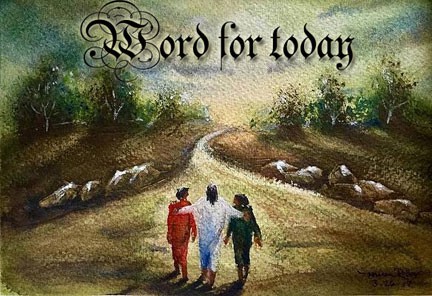Watch
Events
Articles
Market
More
Here's a list of Apostolic Bible passages for reading and studying with Torah portion Vayetzei ("And he went out" Genesis 28:10-32:2), plus links to related commentary and videos: https://www.americantorah.com/....2022/02/27/parsha-va



112425 / 2nd day of the 9th month 5786
WORD FOR TODAY “this promise does not change”: Gen 28:14 "Your descendants will also be like the dust of the earth, and you will spread out to the west and to the east and to the north and to the south; and in you and in your descendants shall all the families of the earth be blessed.
WISDOM FOR TODAY: Pro 19:27 My son, if you stop heeding discipline, you will stray from the principles of knowledge.
Ask the LORD how you can serve HIM better
www.BGMCTV.org




Remember the following:
When YHVH calls you to duty, when He requires you to serve Him in a certain way, when He put that calling on your life, – even if you do not know what it is you have to do yet – He already factored your stupidity into the equation. He already knows how many times you are going to mess up, He already knows how many times you going to have doubt, and He already knows how many times you going to go off the right path. But remember, He is omnipresent! He already knows how stupid and ignorant you are and yet He still put that calling on your life! He still abundantly blesses us through our lack of understanding. What a great and mighty YHVH Elohiym we serve! So, instead of being a backseat passenger, step out in faith and let YHVH work through you, regardless what other people think or say. Life is short. Be blessed



A religious leader who speaks half truths will lead their followers away from our Creator. Jeremiah 5:31, “The prophets prophesy falsely, and the priests rule by their own authority. My people love it so, but what will you do in the end?” Just because you believe what you want to hear, you will not reach your desired destination.



Thought for Today: Monday November 24
When the apostle Paul asked YHVH to remove “his thorn in the flesh”, YHVH did not remove it, saying instead: “My grace is sufficient for you” {2 Corinthians 12:9}. Rather than complain or get angry at YHVH, Paul joyfully submitted to YHVH’s will. He discovered that YHVH’s grace truly was sufficient, even in the midst of pain. The Moshiach desires to be with you in whatever crisis you may find yourself. Call upon Him. See if He will not do as He promised He would. He may not make your problems go away, but He will give you the power to deal with them and to overcome them by His grace.


